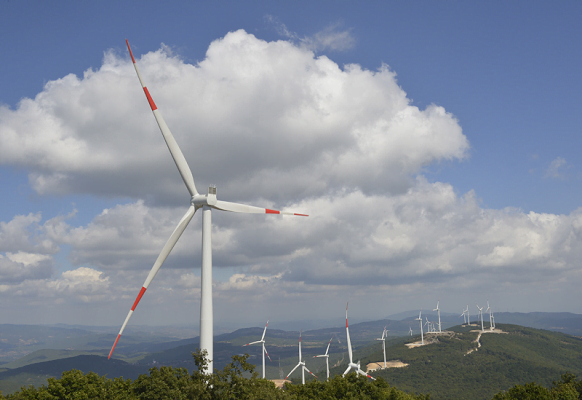Undoubtedly, the “green transformation” movement requires significant financing and knowledge. These two basic factors will be the keywords to transform the global economy into a sustainable structure in the upcoming period.
Arif ERGİN, Lead Marketing Consultant, Turkey Sustainable Energy Financing Facility (TurSEFF)
While the world population is increasing rapidly, their needs are increasing in parallel. The need for more products, more food and more water has put enormous pressure on scarce resources. However, most of the increasing population now lives in cities and the share of urban population is increasing day by day. Investing in efficient technologies and sustainable systems is the only way to meet cities’ growing housing, public transport, clean water, food, and energy needs.
The Turkey Sustainable Energy Financing Facility (TurSEFF) is a financing program developed with that in mind. The European Bank for Reconstruction and Development (EBRD) launched TurSEFF, with funding for technical support provided by the European Union in 2010, with the purpose of financing and providing technical assistance to sustainable energy and resource efficiency investments of private and public sectors. Since 2010, TurSEFF provided over €660 million finance through financial institutions for more than 1,800 sustainability projects of SMEs and municipalities, and as a result significant environmental and economic benefits have been achieved. Savings achieved are equal to the annual electricity consumption of nearly 1 million households. The achieved carbon emission reduction is equivalent to taking more than 1 million cars off the road each year.
TurSEFF’s scope covers many components of sustainability in a wide range, from electric motor replacement in SMEs to solar energy investments, and from sustainable energy projects of large enterprises through ESCOs, to resource-efficient public transportation, drinking water, wastewater and energy investments of municipalities.
Within this context, TurSEFF continued its activities during the pandemic period. During this period, the importance of efficient use of resources, especially in areas such as water, agriculture, and energy, has been clearly seen. Financing of sustainability projects such as waste to energy, solar energy and other renewable energy projects and organization of awareness-raising activities were among the priorities of TurSEFF. With the advantage of the change in legal regulations last year, the rooftop solar investments and hybrid renewable energy projects became other focus areas and we accelerated our efforts of transitioning to clean energy, under the adverse conditions of the pandemic period.
During the lockdown period, online training, seminars, and workshops were organized, and information was shared to create a business atmosphere for new sustainability investments. Workshops on Power Purchase Agreements (PPA) for renewable energy investments were organized, and the investment potential and alternative financial solutions were presented to the sector players.
However, the uncertainty experienced in the world and in exchange rates during the pandemic period resulted as delays in resource efficiency investments. During this period, TurSEFF undertook a guiding mission for the investors, by various training and seminars and emphasized the role of efficiency investments in increasing competitiveness by reduction of costs. Shortening the supply chains is one of the hot topics after pandemics, which will increase both resiliency of the economy and reduce the carbon footprint of logistics of goods.
This may lead to an increase in export facilities, which is one of the most important activities for the recovery of the economy after pandemics. It is crucial for Turkish companies to prioritise these types of green investments to increase their access to the European market along with its logistical advantages. On the other hand, some of the building level energy efficiency refurbishments such as thermal insulation will create job opportunities for the employees which had more pressure during lockdowns and this period.
During the pandemic period, the awareness on climate change-related issues increased, which created an opportunity for a green transformation and the TurSEFF team continues seminars and training to enterprises on green projects and their advantages for sustainable growth. With its green financial solutions blended with technical assistance, TurSEFF will continue its support in the Turkish economy in the coming era.
Since it was launched, TurSEFF has been developing financial solutions focused on generating sustainable energy and resource efficiency projects, and these financial solutions have become financial products among product ranges of TurSEFF partner banks and leasing companies.
EU Green Deal and similar international focus on green transformation increased the awareness of real and financial sectors on green projects. In parallel with the global trend, the Turkish financial sector recognised the advantages of financing green investments and several Turkish banks are now publishing their Green Bond frameworks and have started issuing under these frameworks.
Deposits are the major funding source of the banking sector and constitute 57% of the banking. Having a short-term deposit with less than 90 days average maturity is one of the most important barriers in climate investment finance which requires longer-term. So Green Bonds become more important component to finance climate investments. TurSEFF supports an increase in public awareness as well as to encourage other institutions to issue green bonds. Especially, municipalities and other public sectors who needs to undertake large scale investment for decarbonization of heating, cooling and transportation, as well as water and waste management infrastructure.
This is very encouraging for the real sector as well to change their business into a green and sustainable structure. After its launch in 2010, TurSEFF has played an important catalyst role by creating synergy among the other financing initiatives of the EBRD, such as MidSEFF, which focuses on larger green investments and TuREEFF for residential green investments. By these three SEFF initiatives, the total leverage for private sector investments exceeded €2 billion. Leaving the 10th year behind, we happily see that we are not alone in these efforts and now various parties focused on green economy and its finance.
The world is on the edge of a new era where the key motivation will be sustainability and green. We believe that one of the major guides for transforming markets into the green will be the “EU Green Deal”. The European Union announced its Green Deal action plan and sets concrete targets aiming at mitigating the negative impacts of the climate crisis and using resources efficiently. According to this plan, all EU countries will start to work with the goal of net-zero greenhouse gas emissions by 2050.
This enormous green transformation requires financing and knowledge. These two key factors will be the keys to transforming the global economy in a sustainable structure. The concepts like TurSEFF, blending finance and technical knowledge for sustainable investments will continue to play catalyst roles by generating pioneering case studies not only in the financial sector but also in the real economy as well.








